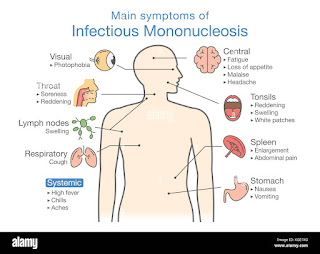What is mononucleosis (mono)?
Mononucleosis is a contagious disease that primarily affects teenagers and young adults, but it can also affect children. Viruses, most often the Epstein-Barr virus (EBV), and infections cause the condition. Because it is easily transferred through bodily fluids such as saliva, mono is commonly referred to as the "kissing illness."
Mono is usually not dangerous and improves without therapy for the majority of patients. On the other hand, extreme weariness, bodily aches, and other symptoms, on the other hand, can interfere with school, work, and daily life. Mono can make you feel ill for up to a month.
Is mono a sexually transmitted infection?
Epstein-Barr is a herpes virus type. The herpes simplex virus (HSV), which causes genital and oral herpes, is not the same virus. During sexual contact, both infections can be spread. However, other methods of transmission, such as sharing a drink or kissing, are more likely to spread EBV.
READ ALSO: What Headache Means, Types, Symptoms And Treatments
How common is mononucleosis (mono)?
Mononucleosis is caused by the Epstein-Barr virus (EBV), which is exceedingly common. Before the age of 35, over 90% of Americans were infected. Some people who are infected with the virus do not develop monosymptoms; others carry the virus.
Is mononucleosis (mono) contagious?
The viruses that cause mononucleosis are highly contagious. You can get them through contact with the infected person's body fluids, including saliva. These viruses are transmitted by:
- Blood transfusions.
- Cough or sneeze.
- Kiss.
- sexual contact
- Sharing food, drinks or cooking utensils.
- Organ transplant.
Can you have mononucleosis (mono) more than once?
Even after the single symptoms have faded, the Epstein-Barr virus stays dormant in your body. Mononucleosis, on the other hand, affects the majority of people only once.
EBV reactivation seldom results in symptoms. You can, however, unintentionally distribute the reactivated infection to others. Patients with weaker immune systems may experience monosymptoms more than once.
READ ALSO: What Headache Means, Types, Symptoms And Treatments
Who can get mononucleosis (mono)?
When it comes to EBV, there are usually two peaks: when children are in school and when they are in adolescence or early adulthood. Children under the age of 20 are frequently asymptomatic, but teenagers and people beyond the age of 20 are more prone to developing mono. Mononucleosis affects about one out of every four people in this age range who contract EBV, although it can affect anyone, regardless of age.
What causes mononucleosis (mono)?
More than 90% of mononucleosis cases are caused by the Epstein-Barr virus. Other viruses and some infections can also cause illness. Symptoms can develop as a result of:
- adenovirus.
- Cytomegalovirus (CMV).
- Hepatitis A, Hepatitis B and Hepatitis C.
- Herpes simplex virus (HSV).
- Human Immunodeficiency Virus (HIV).
- rubella.
- Toxoplasmosis.
What are the symptoms of mononucleosis (mono)?
Mono symptoms can range from minor to severe. They usually appear in stages. If the EBV is contacted, it will most likely go mono four to six weeks later. These signs and symptoms can last up to four weeks:
- Enlarged spleen or liver.
- exhausted.
- Fever.
- Headache.
- Loss of appetite.
- Muscle pain or weakness.
- Eruption.
- Sore throat.
- Swollen lymph nodes in the neck, armpits, or groin.
How is mononucleosis (mono) treated or treated?
There is no vaccine or mono-drug. Antibiotics to fight bacterial infections and antiviral drugs to kill other viruses do not work against mononucleosis. Instead, treatment is aimed at helping you feel better by relieving your symptoms. Your care may include:
- Relaxation: Monkey makes you very tired. Sleep helps your body fight infections.
- Hydration: Drink plenty of fluids to avoid dehydration.
- Pain relievers: Nonsteroidal anti-inflammatory medications (NSAIDs) are pain relievers that help with fever, inflammation, headaches, and muscle pain. Two of these medications are ibuprofen (Advil®) and naproxen (Aleve®).Another option is acetaminophen (Tylenol®).
- Sore throat soothers: If you have a sore throat, gargle with salt water and take lozenges.
- Avoid sports: Physical exercise might increase the risk of spleen rupture by putting too much pressure on the enlarged spleen. During and for up to four weeks after the procedure,
- If you have an illness, you should avoid contact sports and intense exercise.
What are some of the side effects of mononucleosis (mono)?
Over the course of four weeks, mono tends to improve. Fatigue can continue for weeks or even months. When they recuperate, some people drop out of school or lose their jobs.
Spinal cord injury is a major concern with mono in healthy people. This leg at the top left of the abdomen (abdomen) helps to filter the blood. If the spleen breaks, there may be blood in the stomach. Intracranial hemorrhage can be fatal and requires emergency surgery. Your doctor may tell you to avoid strenuous exercise, contact sports, and lift weights until you feel better.
How is mononucleosis (mono) diagnosed?
Your doctor will examine your symptoms in order to make a diagnosis. They check for symptoms of an enlarged spleen or liver, as well as enlarged lymph nodes in the neck.
Antibodies produced by your body to fight the Epstein-Barr virus are detected by blood tests. Doctors may also check for an infection by looking for a high white blood cell (lymphocyte) count.
READ ALSO: What Headache Means, Types, Symptoms And Treatments
How can I prevent mononucleosis (mono)?
There is no vaccine against mono. The best way to avoid the proteins that cause mononucleosis is to do cleansing exercise. Do not share food, drink, or fluids with anyone with mononucleosis or any protein symptoms, such as fever, cough, sore throat, or fatigue.
What is the prognosis of people with mononucleosis (mono)?
Mono symptoms can be severe. They can temporarily affect your ability to live an active life. Fortunately, these symptoms are more pronounced with home remedies.
You may experience frequent fatigue for several months. You need to protect your health by resting a lot and drinking water during this time. You should also avoid strenuous activities to prevent sore throats.
When should I call a doctor?
You should call your doctor if you have mononucleosis and experience:
- Difficulty breathing or moving.
- Dizziness or fainting.
- Excessive muscle weakness in the arms or legs.
- Great pain.
- Persistent high fever.
- Severe headaches.
- Intense pain in the upper left abdomen.
How does mononucleosis (mono) affect pregnancy?
Pregnant women who develop the EBV gene often have healthy pregnancies. Call your doctor if you have a fever, which may increase your risk of miscarriage and preeclampsia. Although there is little chance of passing Epstein-Barr protein to your baby during pregnancy or postpartum during breastfeeding, most babies do not develop symptoms of mononucleosis. If mononucleosis is caused by a CMV infection during pregnancy, your baby may be affected and you should talk to your counselor.
What questions should I ask my doctor?
If you have a mono, you can ask your doctor:
- What are the best treatments for mononucleosis symptoms?
- How long have I been helping myself?
- What steps can I take to prevent other people from getting infected with this virus?
- How long will it take to recover from mononucleosis?
- When can I go back to work or school?
- When can I resume exercise and physical activity?
- Can I put on a jumpsuit again?
- Should I look for signs of complications?
The majority of cases of mononucleosis (mono) do not result in serious problems. Symptoms like excessive weariness, sore throat, and body pains, on the other hand, might cause problems at school, work, and in everyday life. Your doctor can advise you on how to get some relief. The best techniques to treat symptoms are relaxation and over-the-counter drugs. It's also crucial to avoid strenuous physical exercise, which can result in bigger bones.
READ ALSO: What Headache Means, Types, Symptoms And Treatments




